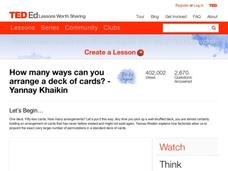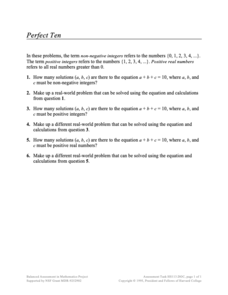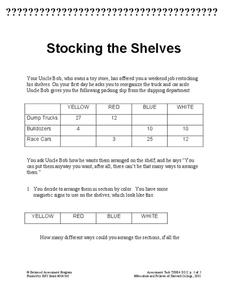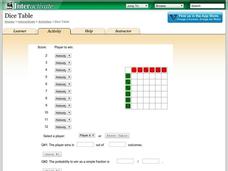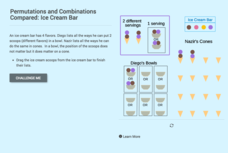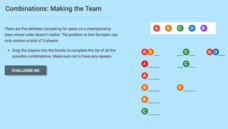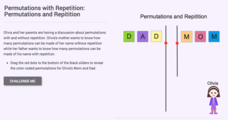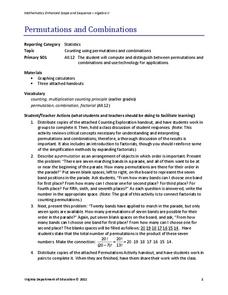Mathalicious
Three Shots
To foul or not to foul, that is the basketball question. High schoolers look at the probability that fouling out a player and allowing free throws yields a better outcome than allowing the original shot. The resource provides a...
Curated OER
Series Review Sheet
Save an infinite amount of time and enjoy this pre-made series formula guide. Arithmetic and geometric formulas are all included as well as Pascal's Triangle and examples of how the Binomial Theorem expands.
TED-Ed
How Many Ways Can You Arrange a Deck of Cards?
Entertain and grab your learners' attention with a short video clip that engagingly teaches the concept of a permutation and how a factorial is a wonderful shortcut for theoretical probability calculations.
Curated OER
Modeling Conditional Probabilities 1: Lucky Dip
Check out this detailed lesson plan on conditional probability! Learners work individually and also collaboratively to analyze the fairness of a game and justify their reasoning. it includes detailed notes and many helpful...
Children’s Hospital of Philadelphia
Development of Disease and Infection
It's all in the cards. Using cards to simulate a disease's attack on the immune system, pupils develop an understanding of how the immune system and pathogens react to each other and why at times the pathogen wins. Groups play a game to...
Illustrative Mathematics
Random Walk III
Don't cross the line; just walk along it. Scholars investigate a scenario in which a person starts at zero on a number line, then moves left or right depending on a flip of a coin. They determine the number of outcomes for six flips,...
Rice University
Introductory Statistics
Statistically speaking, the content covers several grades. Featuring all of the statistics typically covered in a college-level Statistics course, the expansive content spans from sixth grade on up to high school. Material...
Rice University
College Algebra
Is there more to college algebra than this? Even though the eBook is designed for a college algebra course, there are several topics that align to Algebra II or Pre-calculus courses. Topics begin with linear equation and inequalities,...
Rice University
Algebra and Trigonometry
Move on into trigonometry. An informative eBook takes the content of a College Algebra course and adds more relating to trigonometry and trigonometric functions. The content organization allows pupils to build upon their learning by...
Concord Consortium
Perfect Ten
How many ways can you make 10? Class members tackle three problems to find all possible ways three numbers add to be 10. The first is with positive integers, secondly with non-negative integers, and finally with real numbers. Pupils also...
Concord Consortium
Stocking the Shelves
How many ways can you stock a shelf? It's probably more than you think! Young scholars use data in a frequency table to determine how many ways to stock a shelf given a specific constraint for types of groups. They then repeat the task...
101 Questions
Safe Cracking
How long would it take to break into a safe by testing every possible combination of codes? Pupils view a video clip of this happening and must determine the total amount of time before success. They measure how long each step takes, add...
Shodor Education Foundation
Spinner
Go round and round to compare theoretical and experimental probabilities. Learners set the number of sectors and the number of spins for a spinner. Then, a table displays the experimental and theoretical probabilities of the spinner for...
Shodor Education Foundation
Marbles
Grab some marbles from a bag. The applet simulates drawing marbles from a bag. Pupils determine the number of four colors of marbles in a bag and how many marbles to draw. Using information on whether order matters in the draw and if...
Shodor Education Foundation
Dice Table
Convert a table to probabilities. Pupils set up the winning rules for the sums of two dice. Using the rules, the applet fills out a table showing the winners for each combination. Learners determine the probabilities of winning for each...
CK-12 Foundation
Permutations and Combinations Compared: Ice Cream Bar
Learning math from an ice cream shop—what a tasty treat! Individuals use an interactive to list all possibilities for a double-scoop ice cream. Along the way, they learn to distinguish between permutations and computations.
CK-12 Foundation
Permutations and Combinations Compared: Colored Candies
Here's a sweet resource on sample spaces. An enticing interactive allows users to list all possibilities for the flavors of candy given to a friend. Scholars must also determine whether permutations or combinations are more...
CK-12 Foundation
Permutations: Podiums
Add a winning resource to your library. A self-paced interactive has users create a sample space for all possibilities of arranging first- and second-place winners on a podium. The results lead to the realization that permutations...
CK-12 Foundation
Combination Problems: Friends at a Party
Friend or stranger? Can there be less than three in a group? The interactive asks learners to prove that for seven people at a party, at least three of them are either mutual friends or mutual strangers. Pupils determine the number of...
CK-12 Foundation
Combinations: Making the Team
Determine how many three-player teams you can make from five players. Pupils drag dots representing players to create a list of teams they can form with a limited number of players. They then find out the number of teams one...
CK-12 Foundation
Permutations with Repetition: Permutations and Repetition
What's in a name? An interactive asks users to find the number of ways to arrange the letters in the word DAD and MOM. Pupils use the interactive to arrange the letters but restrict the permutations to be unique for MOM and answer...
Noyce Foundation
Cubism
If cubism were a religion, would you follow it? Lower-level tasks focus primarily on counting the number cubes in a structure and relating the number to surface area. As learners progress to higher-level tasks, isometric drawings and...
Virginia Department of Education
Permutations and Combinations
Counting is not all it adds up to be — sometimes it involves multiplying. The lesson introduces permutations and combinations as ways of counting, depending upon whether order is important. Pupils learn about factorials and the formulas...
Balanced Assessment
MasterMind
Knowledge of statistics and probability can increase your advantage when playing games. The activity asks learners to analyze the game of MasterMind to determine the number of possible codes. They also examine different variations of the...




